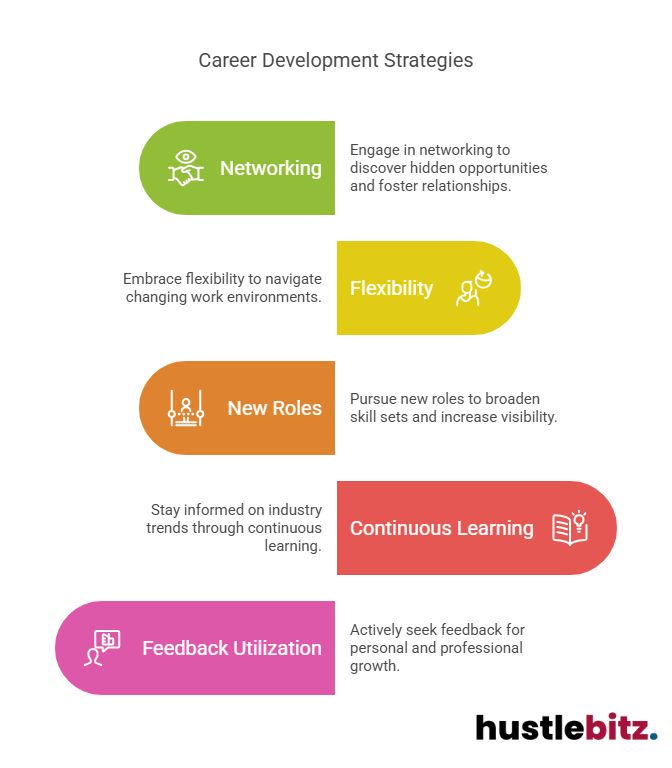Strategies for sustainable career growth and success hinge on proactive engagement and adaptability. Networking effectively is crucial; attend industry events and build relationships that can uncover hidden opportunities. Continuous skill enhancement and flexibility in career roles position you to navigate industry changes confidently. Embrace leadership roles and seek cross-industry knowledge to broaden your perspective. Moreover, personal branding on platforms like LinkedIn strengthens your professional presence. Regularly solicit feedback to foster growth and consider calculated risks to achieve your aspirations. Embracing these strategies can create a solid foundation for long-term success, with insights waiting to be uncovered.
Key Takeaways
- Engage in networking to discover hidden opportunities and foster relationships that can lead to career advancements.
- Embrace flexibility and adaptability to navigate changing work environments and enhance professional resilience.
- Pursue new roles and leadership opportunities to broaden skill sets and increase visibility within your organization.
- Stay informed on industry trends through continuous learning and participation in relevant associations and conferences.
- Actively seek and utilize feedback for personal and professional growth, turning insights into actionable improvements.

Unlock Hidden Career Opportunities

In today’s competitive job market, identifying and unlocking hidden career opportunities can be crucial for professional advancement and long-term success. One effective approach is to implement robust networking strategies. Engaging with professionals in your field through industry events, workshops, and online platforms can reveal unadvertised positions and insider insights. Furthermore, participating in mentorship programs can foster invaluable relationships, providing guidance and opening doors to opportunities that may not be immediately apparent.
To enhance employability, skill diversification is essential. Acquiring new competencies, particularly in emerging areas such as remote work technologies, can make candidates more attractive to potential employers. Additionally, maintaining a strong online branding presence through platforms like LinkedIn allows individuals to showcase their skills and experiences, effectively attracting opportunities aligned with their career aspirations.
Volunteer opportunities also present unique avenues for growth. By contributing to non-profit organizations or community projects, individuals can develop their emotional intelligence and leadership skills while expanding their professional network. Staying abreast of industry trends helps to identify shifts that could signal emerging job markets, enabling proactive career planning.
Lastly, joining professional associations can provide access to exclusive resources and networking events. These organizations often offer workshops, seminars, and forums that facilitate personal branding and career advancement. By actively engaging in these strategies, professionals can uncover hidden career opportunities that align with their goals, ensuring sustainable growth in an ever-evolving work landscape.
Harness the Power of Flexibility

Embracing flexibility in career planning not only enhances adaptability but also fosters resilience in navigating the complexities of today’s dynamic work environment. As remote work becomes increasingly prevalent, professionals must develop adaptability skills to thrive under varying circumstances. This flexibility allows individuals to balance their personal and professional lives, ultimately promoting a healthier work-life balance.
Skill diversification is essential in this landscape; acquiring a range of competencies can prepare you for diverse roles and opportunities. In a world where digital nomadism is gaining traction, understanding how to market your skills through personal branding becomes crucial. Building a strong brand can enhance your visibility, making you a sought-after candidate for remote positions.
Effective networking strategies also play a pivotal role in harnessing flexibility. Engaging with a broad network can open doors to new opportunities and collaborations, allowing you to adapt to shifting job markets. Moreover, honing time management skills is vital to managing various responsibilities, especially when working remotely.
Emotional intelligence further enriches your adaptability, enabling you to navigate interpersonal dynamics with ease. By being attuned to your own emotions and those of others, you can foster stronger professional relationships.
Lastly, embracing continuous learning is paramount. The willingness to acquire new knowledge and skills not only keeps you relevant but also fuels your career growth.
Challenge Yourself with New Roles

Pursuing new roles within your organization or industry can significantly enhance your skill set and propel your career forward. Engaging in role exploration allows professionals to identify and seize opportunities that foster skill diversification. By stepping into different roles, you can gain valuable insights into various functions, thereby enriching your overall expertise.
One effective approach to challenging yourself is through lateral moves, which can provide a fresh perspective and broaden your understanding of the business. Participating in mentorship programs can also be instrumental; a mentor can guide you through adaptability training, helping you navigate new responsibilities while developing your personal brand.
In addition, taking on project leadership roles can boost your visibility within the organization, showcasing your ability to manage teams and drive results. Volunteer initiatives and job shadowing further enhance your understanding of different roles, allowing you to assess your compatibility with various career paths without committing fully.
Networking strategies are essential in this journey; connecting with colleagues in different departments can reveal hidden opportunities and insights. By actively engaging with others, you can cultivate relationships that may lead to new roles or projects.
Ultimately, challenging yourself with new roles not only prepares you for advancement but also enriches your professional narrative. Embracing these opportunities is a proactive step towards sustainable career growth and success, ensuring you remain relevant and competitive in an ever-evolving job market.
Seek Out Cross-Industry Knowledge

Cross-industry knowledge serves as a powerful catalyst for innovation and adaptability in today’s rapidly changing job landscape. By seeking out cross-industry insights, professionals can enhance their understanding of various sectors, which fosters creative problem solving and encourages the adoption of innovative practices. Engaging with diverse perspectives not only broadens one’s viewpoint but also enriches the decision-making process.
To effectively leverage cross-industry knowledge, individuals should focus on collaborative learning opportunities. Networking strategies that connect professionals from different fields can lead to fruitful knowledge sharing and the development of transferable skills that are applicable across various domains. Attending industry conferences, workshops, or seminars provides an excellent platform for such interactions, enabling individuals to stay informed on industry trends and best practices.
Moreover, actively participating in cross-industry groups or forums encourages ongoing skill enhancement. These environments facilitate an exchange of ideas that can inspire new approaches to challenges faced in one’s own industry. Additionally, cultivating relationships with mentors from diverse backgrounds can yield valuable insights and guidance.
In essence, seeking out cross-industry knowledge not only equips professionals with a broader skill set but also positions them as adaptable leaders in their respective fields. By embracing this approach, individuals can unlock new opportunities for career growth and success, ensuring they remain relevant and competitive in an increasingly interconnected world.
Reinvent Your Professional Identity

In an era where adaptability is key, professionals must consider reinventing their identities to align with evolving industry demands and personal aspirations. The process of professional reinvention not only enhances personal branding but also strengthens one’s value proposition within the marketplace. As industries undergo rapid transformations, skill diversification becomes essential. This enables professionals to remain relevant and competitive in their fields.
To effectively reinvent your professional identity, consider the following strategies:
- Conduct a Self-Assessment: Utilize self-assessment tools to identify your strengths, weaknesses, and areas for growth. This clarity will guide your reinvention efforts.
- Enhance Your Online Presence: Curate a digital footprint that reflects your new identity. Leverage social media platforms and professional networks to showcase your skills and achievements.
- Develop Networking Strategies: Engage in proactive networking to establish relationships within your industry and beyond. Building mentorship relationships can provide invaluable insights and guidance during your transition.
- Stay Informed on Industry Trends: Regularly update yourself on industry trends to ensure your skills and knowledge remain relevant. This will bolster your confidence in discussions and presentations.
Ultimately, reinventing your professional identity requires a commitment to lifelong learning and self-improvement. By focusing on these strategies, professionals can confidently navigate their careers, ensuring they meet both personal and professional aspirations while contributing meaningfully to their industries.
Build a Culture of Collaboration
Fostering a culture of collaboration within an organization is essential for driving innovation, enhancing employee engagement, and achieving sustainable career growth.
Effective team dynamics are cultivated through open communication, where employees feel comfortable sharing ideas and expressing concerns. By prioritizing trust building, organizations create an environment where team members can collaborate freely without fear of judgment.
Establishing shared goals is crucial; when employees understand their collective objectives, they are more inclined to work together toward achieving them. This alignment not only boosts productivity but also strengthens relationships among team members.
Conflict resolution strategies should be implemented to address misunderstandings promptly, ensuring that challenges do not hinder collaboration.
Creating inclusive environments allows diverse perspectives to flourish, leading to creative brainstorming sessions that generate innovative solutions. Encouraging knowledge sharing among employees promotes a sense of community and enhances overall skill sets, equipping teams to tackle complex challenges effectively.
Furthermore, mentorship programs can play a vital role in nurturing collaboration. Experienced employees can guide newcomers, fostering a sense of belonging and motivating individuals to contribute their unique insights.
An appreciation culture, where accomplishments are recognized and celebrated, reinforces collaborative efforts and encourages continuous improvement.
Turn Feedback into Growth
Building on a culture of collaboration, turning feedback into growth is a pivotal strategy for professional development and organizational success. Embracing constructive criticism fosters a growth mindset, allowing individuals and teams to thrive. By establishing effective feedback loops, organizations can ensure that insights gained during performance reviews and peer evaluations translate into actionable improvements.
To effectively turn feedback into growth, consider the following strategies:
- Establish Regular Feedback Mechanisms: Implement structured performance reviews and peer evaluations to create a continuous feedback loop that encourages open dialogue and reflection.
- Encourage Self-Reflection Techniques: Promote self-assessment and reflective practices among employees. This allows them to internalize feedback and identify areas for personal and professional development.
- Leverage Mentorship Opportunities: Pair employees with mentors who can provide constructive criticism and guidance, enhancing their emotional intelligence and ability to navigate challenges.
- Foster a Culture of Continuous Improvement: Encourage teams to view feedback as a tool for ongoing development rather than a punitive measure, ensuring that all members are aligned with shared growth objectives.
Pursue Strategic Risks and Rewards

Strategic risks can serve as pivotal opportunities for career advancement, enabling professionals to innovate and differentiate themselves in a competitive landscape. To effectively harness these opportunities, individuals must engage in calculated risks that align with their career goals. This involves thorough reward assessment, where potential benefits are weighed against possible downsides, ensuring that decision making is informed and deliberate.
Effective risk management is essential in navigating uncertainties that accompany strategic risks. Professionals should undertake opportunity evaluation to identify which risks align with their strengths and career aspirations. This process encourages innovation adoption, allowing individuals to explore novel ideas and approaches that can enhance their professional value.
Moreover, establishing a clear framework for strategic planning empowers professionals to set realistic goals while maintaining a healthy risk tolerance. By understanding their capacity for risk, individuals can make informed choices that foster growth, ultimately leading to a competitive advantage in their field.
Outcome analysis is crucial after pursuing strategic risks, as it allows professionals to assess the impact of their decisions. Reflecting on both successes and setbacks fosters a culture of continuous improvement, enhancing future risk-taking endeavors.
Final Thoughts
Sustainable career growth requires adaptability, continuous learning, and a proactive mindset. By leveraging strategies such as networking, skill diversification, and leadership development, you can position yourself for long-term success. It’s important to remain flexible, seek out new challenges, and embrace feedback as a tool for improvement. As you implement these strategies, your career will evolve alongside changing industry demands, ensuring that you stay ahead and maintain a competitive edge. Remember, career growth is a journey, not a destination—so stay open to new opportunities and continue building the foundation for your success.




